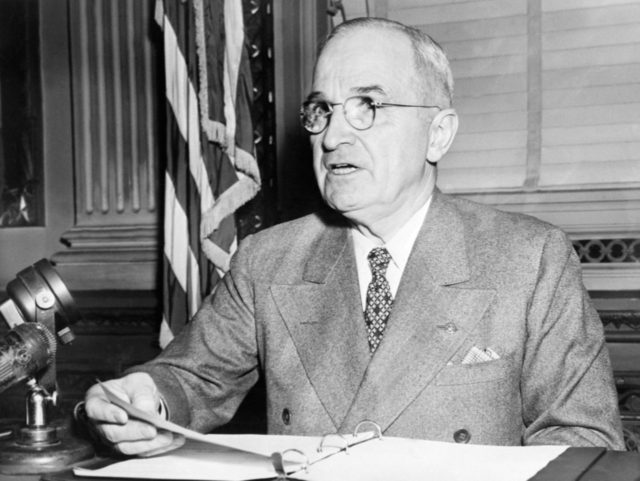On May 14, 1948, U.S. President Harry Truman recognized the newly-declared State of Israel — over the vehement objections of the State Department, which was partial to the Arab states and lacked confidence that the Jewish state could defend itself.
Truman declared:
This Government has been informed that a Jewish state has been proclaimed in Palestine, and recognition has been requested by the provisional Government thereof.
The United States recognizes the provisional government as the de facto authority of the new State of Israel.
Truman’s brief telegram was an act of immense political courage.
For months, his leading foreign policy advisers, including Secretary of State George C. Marshall, had been urging him not to recognize Israel, but rather to consider a prolonged “trusteeship” of Palestine after the British Mandate had expired.
In brazen tactics reminiscent of the “deep state” methods being used by the federal bureaucracy against President Donald Trump today, the State Department even tried to tie Truman’s hands. As one of his advisers, Clark Clifford, later recalled:
My fears about the State Department had crystallized after a bitter incident in March, when, without informing the President, it had permitted the American delegation to the UN to reverse its support for partition and switch to trusteeship for Palestine – a contradiction of a personal commitment the President had given the previous day to Chaim Weizmann, the Zionist leader who would later become the first President of Israel. Furious and depressed when he learned what had happened, President Truman wrote on his calendar for March 19, 1948: “The State Dept. pulled the rug from under me today….The first I know about it is what I see in the papers! Isn’t that hell? I am now in the position of a liar and a double-crosser. I’ve never felt so low in my life. There are people on the third and fourth level of the State Dept. who have always wanted to cut my throat. They’ve succeeded in doing it.”
The State Deparment’s arrogance merely strengthened Truman’s resolve on the issue. Truman wrote to his sister on March 21, 1948 that the State Department’s “striped pants conspirators” had “balled up” the issue, but added that “it may work out anyway in spite of them.”
On May 12, Truman presided over a decisive meeting in the Oval Office. The State Department presented its case against Israel. Clifford was there, and spoke in favor of recognition. Secretary Marshall objected to his presence, adding: “If you follow Clifford’s advice and if I were to vote in the election, I would vote against you.”
President Truman did not make his decision known until the fateful day itself. The president’s staff made clear to the State Department that if it opposed him, Truman was prepared to fight a political war against it. Finally, the bureaucrats backed down.
The diplomats at the United Nations were taken by surprise. Clifford notes their reaction in his memoir: “As The New York Times reported the next morning, ‘the first reaction was that someone was making a terrible joke, and some diplomats broke into skeptical laughs.'”
But reality soon set in. The United States had recognized Israel — and the Soviet Union did the same a few days later.
Since then, the State Department has generally retained an anti-Israel bias — partly because of the oil reserves controlled by Israel’s enemies, and partly because of the sheer number of Arab and Muslim states, which allows them to exert disproportionate power in many international institutions.
The left’s embrace of the Palestinian cause has also affected the political culture in Washington. The consensus in the foreign policy community is that moves such as relocating the U.S. embassy to Jerusalem would launch — indeed, almost justify — a “third intifada.”
But for Truman, the issue of recognizing Israel was fundamentally a moral one. And he was not going to let any bureaucrat, or any foreign threat, stand in his way.
As he wrote to his brother on March 22, 1948: “I think the proper thing to do, and the thing I have been doing, is to do what I think is right and let them all go to hell.”
Joel B. Pollak is Senior Editor-at-Large at Breitbart News. He was named one of the “most influential” people in news media in 2016. He is the co-author of How Trump Won: The Inside Story of a Revolution, is available from Regnery. Follow him on Twitter at @joelpollak.

COMMENTS
Please let us know if you're having issues with commenting.